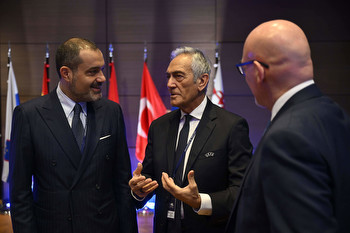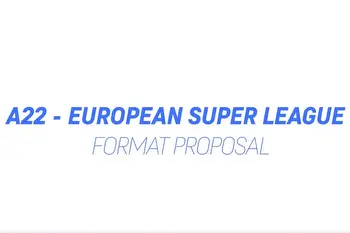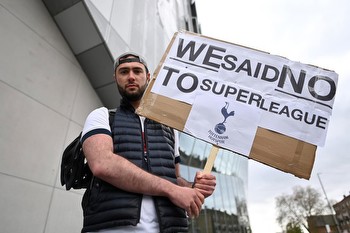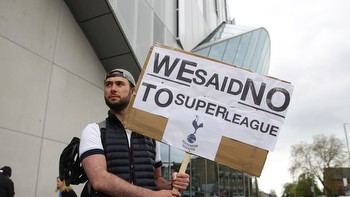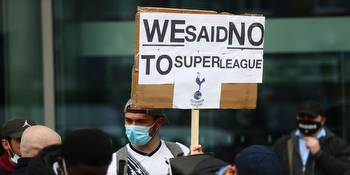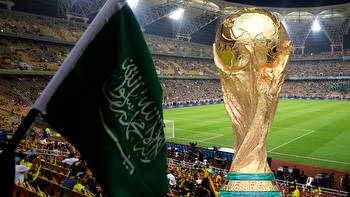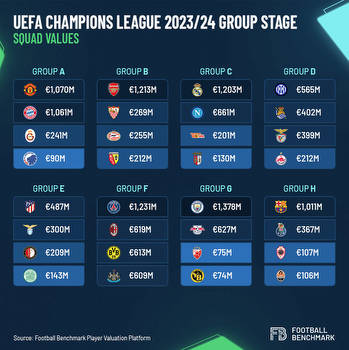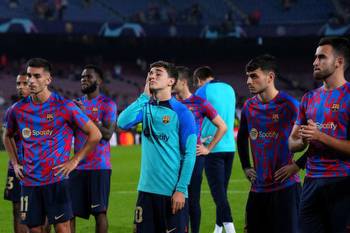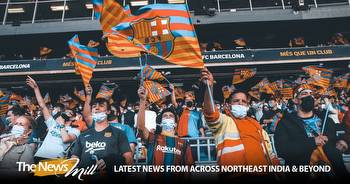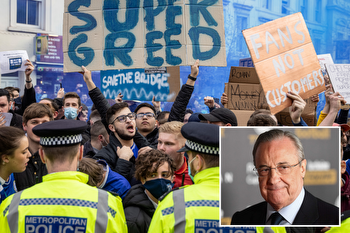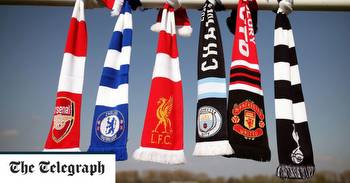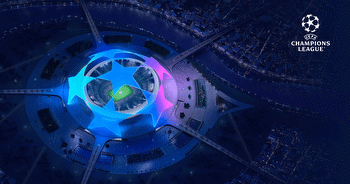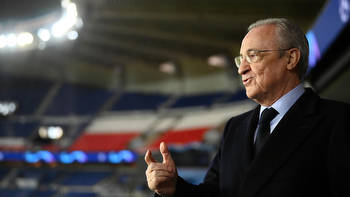European Super League: Premier League rejects concept after EU's top court rules FIFA and UEFA acted unlawfully in blocking breakaway competition
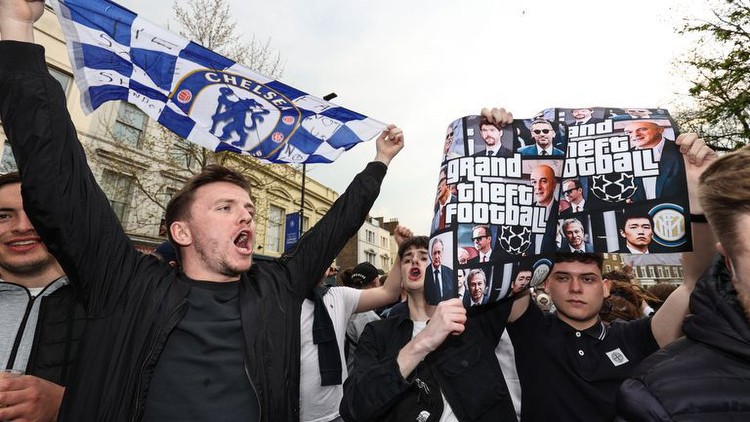
Manchester United, Manchester City, Chelsea and Tottenham have all pledged their commitment to the existing competitions they play in, while the Premier League has rejected the European Super League concept following Thursday's European Court of Justice ruling.
On Thursday, judges said UEFA rules blocking the formation of a new competition, such as the European Super League, were contrary to EU law - but added that the competition may still not be approved.
The Premier League said: "The ruling does not endorse the so-called 'European Super League' and the Premier League continues to reject any such concept.
"Supporters are of vital importance to the game and they have time and again made clear their opposition to a 'breakaway' competition that severs the link between domestic and European football."
Manchester United released a statement on Thursday saying they "remain fully committed to participation in UEFA competitions", while Manchester City and Tottenham said they are "committed to the values of European football".
A Chelsea statement said: "The judgement issued today does not change Chelsea's position".
The two other 'Big Six' clubs Arsenal and Liverpool are yet to release a statement following Thursday's ruling.
The Grand Chamber of the European Court of Justice had been asked to decide whether UEFA and FIFA acted against competition law by blocking the formation of the European Super League in 2021 and then seeking to sanction the clubs involved.
The original 2021 Super League proposal was criticised for its 'closed' format, with 15 founder clubs set to have been immune from relegation.
The new European Super League proposal
Please use Chrome browser for a more accessible video player
A22 - a company formed to assist in the creation of the European Super League - has released details of its latest concept ,which includes men's and women's midweek competitions with promotion and relegation.
It said:
- There will be two stages - the league stage and the knockout stage. The men's league stage will have 64 teams split into three leagues - Star, Gold and Blue. The women's league stage will have 32 teams split into two leagues - Star and Gold.
- Star andGold leagues in both competitions will be 16 teams split into two groups of eight. The Blue league will be 32 teams split into four groups of eight.
- The top four teams in the two Star and Gold league groups will compete in the knockout rounds, consisting of two-legged quarter-finals and semi-finals. The top two teams in the four Blue league groups will do the same. The winners of each final will be crowned Star, Gold or Blue league champions.
- The two teams who reach the Gold and Blue finals - or just Gold in the women's competition - will earn promotion to the league above. The teams at the bottom of the two Star league groups will be relegated to the Gold league.
- In the men's Gold league, the two bottom-placed teams in each group will be relegated to the Blue league. 20 of the 32 Blue league teams will drop out of the competition at the end of their campaign, replaced by clubs depending on their domestic league performance.
- In the women's Gold league, four teams will drop out of the league at the end of their campaign, replaced by clubs depending on their domestic league performance.
Can a European Super League be stopped?
There are many obstacles in A22's path even if the judgement suggests it does have the right to pitch a new competition to UEFA that can operate under UEFA's auspices, and for UEFA to give that competition full and fair consideration.
These include the will of clubs, existing agreements between the European Club Association and UEFA, and the fact that the existence of a joint venture between ECA and UEFA on commercial matters at the very least challenges A22's assertions about a monopoly.
In England, clubs are set to be forbidden from joining unapproved competitions as a licensing condition to be set by the English game's new independent regulator, while the Premier League's Owners' Charter agreed in 2022 also contains undertakings not to "engage in the creation of new competition formats outside of the Premier League's rules".
Supporters in England took to the streets despite coronavirus restrictions when the initial Super League plans became known, and played a key part in its collapse.
The Grand Chamber judgement's interpretation of EU law will be passed back to a Madrid commercial court to make a decision, after the Spanish jurisdiction made the referral in 2021.
That court also placed an injunction on sanctions UEFA imposed on the nine clubs who joined the Super League but who later withdrew. It remains to be seen whether UEFA will press on with those sanctions, and potentially investigate more serious charges against Real Madrid and Barcelona.
Timeline: How did we get here?
'Verdict could have huge ramifications for future of football in Europe'
Please use Chrome browser for a more accessible video player
Sky Sports News' chief reporter Kaveh Solhekol:
"Two-and-a-half years ago, 12 of the biggest clubs in Europe tried to set up a European Super League and, straight away, they felt the full force of UEFA's rules. UEFA came out and said they were not allowed to set up this league and if they did, they would punish the players and the clubs as well. Pretty quickly - and you have to factor in the effect the fans had - the clubs started melting away and within two or three days, the whole project had collapsed.
"Three clubs - Juventus, Barcelona and Real Madrid - kept fighting for the right to be able to set up a European Super League. Juventus dropped out earlier this year, which left Real Madrid and Barcelona. They set up a company called A22 Sports to carry on promoting the Super League project - and they also went to the courts.
"What the European Super League company was doing by going to the European Court of Justice was saying 'what UEFA is doing is anti-competitive, it is breaking EU laws and you must stop this'.
"Today, the 15 judges in the European Court of Justice's Grand Chamber in Luxembourg came back in their verdict - and they were very strong in what they said. They said FIFA and UEFA's rules on prior approval of new competitions are contrary to EU law and that rules stopping clubs and players playing in new competitions are unlawful. They also said the existing rules give FIFA and UEFA exclusive control and restrict competition and that FIFA and UEFA are abusing a dominant position.
"A very significant verdict from Luxembourg this morning, which could have huge ramifications for the future of football in Europe."
Could the Premier League clubs join again?
A European Super League is a total non-runner without the involvement of English clubs and it would be impossible for them to join as things stand.
Page one of the Premier League handbook has the revised owners' charter which states clearly:
"We are collectively committed to the Premier League and recognise our responsibility to support it. We will not engage in the creation of new competitive formats outside the Premier League's rules".
The UK government also wants to set up an independent football regulator which will ban clubs from joining breakaway leagues.
Manchester United released a statement on Thursday lunchtime reiterating their commitment to UEFA competitions: "Our position has not changed. We remain fully committed to participation in UEFA competitions, and to positive cooperation with UEFA, the Premier League, and fellow clubs through the ECA on the continued development of the European game."
How have other clubs and organisations responded?
A22 CEO Bernd Reichart posted on X, formerly known as Twitter: "We have won the #RightToCompete. The UEFA-monopoly is over. Football is FREE. Clubs are now free from the threat of sanction AND free to determine their own futures.
"For fans: We propose free viewing of all Super League matches.
"For clubs: Revenues and solidarity spending will be guaranteed."
In their response, UEFA said the ruling "does not signify an endorsement or validation of the so-called 'super league'; it rather underscores a pre-existing shortfall within UEFA's pre-authorisation framework, a technical aspect that has already been acknowledged and addressed in June 2022. UEFA is confident in the robustness of its new rules, and specifically that they comply with all relevant European laws and regulations."
FIFA responded: "In line with its statutes, FIFA firmly believes in the specific nature of sport, including the pyramid structure - which is underpinned by sporting merit - and the principles of competitive balance and financial solidarity.
"Football owes its long and successful history to the above-mentioned principles, which FIFA, the confederations and the member associations will continue to promote in the future, in the interest of all football fans worldwide."
However, the PFA warned this judgement should be a wake-up call for UEFA and FIFA. "The importance of this morning's ruling isn't about proposals for new competitions or any 'European Super League', but, more widely, what it says about the powers and authority of FIFA and UEFA.
"With too many major reforms in the game, including those related to the fixture calendar, they have felt able to push forward without proper engagement or consultation, and often despite concern or opposition from leagues, clubs, players and their unions.
"This should act as a wake up call and, we hope, a signal that this approach now has to change."
Please use Chrome browser for a more accessible video player
Meanwhile, Barcelona said they "wish to express satisfaction" with the ruling. Speaking in a televised statement, club president Joan Laporta said: "We believe that the time has come from clubs, and even more so for those that owned by their members, such as Barcelona, to have greater control over their destiny, over their future and over their own sustainability."
He also stated Barca were not looking to go against the Spanish league or other domestic leagues but argued the new proposal would actually make those leagues "more balanced and competitive".
Laporta's opposite number in the chase for the ESL - Real Madrid president Florentino Perez - also added in a statement: "European club football is not and will never again be a monopoly. Secondly, from today the clubs will be the masters of their destiny."
However, other European clubs have spoken out against the ESL idea. Bayern Munich said: "Such a competition would be an attack on the importance of the national leagues as well as the statics of European football."
Atletico Madrid made a three-point statement saying the court's ruling was based on "outdated UEFA statutes" which had been revised, UEFA's partnership with the European Club Association means it is not a monopoly, and that the European football community - except for Real Madrid and Barcelona - "does not support the European Super League".

